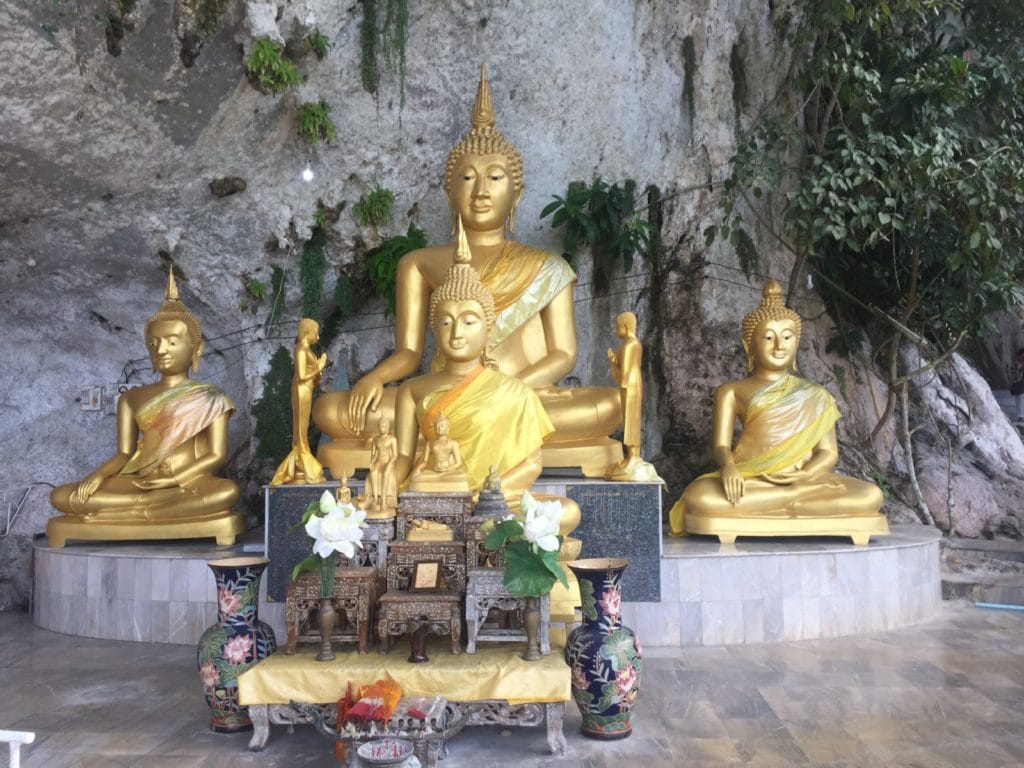The founder of the famous Suan Mokkh temple and one of the most influential Buddhist figures in Thailand, Ajahn Buddhadasa promoted his life motto: “อยู่อย่างต่ำมุ่งกระทำอย่างสูง”, which could be translated as “Live plainly and aim high”, or as “Live simple life, aim for high goals” throughout his whole life as the head of this Temple.
This rule of life is truly the core of the Buddhist way of life, and one that ensures your inner peace. When you live like this, you can achieve more with less. You can focus on important things in your life. People today are often too strongly dedicated to maintaining and improving their material wealth, forgetting that this is not the only important quality of life.
Living a simpler life, you have fewer things to worry about, fewer distractions and less stress. You can think clearer and have the time to realize your true goals in life.
The noble eightfold path a way to live plainly and aim high
Buddhism teaches you the way to achieve happiness is to follow the Noble eightfold path. Those are simple rules and core principles of Buddhism.
Proper life is something that is developed when you know what the intentions are behind what you do. You can try to avoid endangering other living beings or earn a living in a way that does not endanger others. You can also try to avoid a life that causes other people to become addicted to drugs or alcohol, or it can endanger the ecological balance of the planet.
We can divide these principles into three groups
1. The concentration group (samadhi-khanda), which consists of correct effort, correct consciousness, and correct concentration;
2. Group of moral discipline (Sila-khanda), consisting of right speech, right action and right way of life;
3. Group of wisdom (pañña-khanda), composed of right understanding and right intention.
Concentration
(1) Right view precisely implies seeing the Four Noble Truths or at least seeing the signs of the Four Noble Truths, namely, Suffering, the Cause of Suffering, the Cessation of Suffering and the Path Leading to the Cessation of Suffering.
(2) Right aspiration is a state of mind, in the sense of focusing; virtue is not to be found in the ordinary person in the highest sense, that is, an inclination or resolution to attain Nibbàna. This kind of inclination directly leads to the Cessation of Suffering or Nibbàna.
Moral discipline the core of “live plainly and aim high”
Next three members – right action, right speech, and right life – follow from a correct understanding or perfect knowledge.
Right speech
(3) Right speech is perhaps the hardest thing to train; Speech habits are hardest to eradicate and leave – but there is also a potential for improvement. Thanks to reflection and contemplation, we begin to realize how uncomfortable it is when we say something reckless or when we make a mistake for no reason.
Right Action
(4) Right action is proper behaviors, involving no harm either to yourself or to others. Right Action leads to even more noble actions, also known as three of the Five precepts, together with, avoiding false or harmful speech, or intoxicants leading to carelessness. This means abstinence from:
- The Destruction of Life
- Taking What is Not Given
- Sexual Misconduct
Right Livelihood
(5) Right Livelihood represents actions of making a living or accumulating wealth, avoiding the Wrong Livelihood by nurturing the Sources of Welfare and Happiness in the Present Life. This include:
- The accomplishment of persistent effort by which a person earns a living
- The accomplishment of protection over the wealth acquired by his work; righteous wealth righteously gained.
- Good friendship
- Balanced living, neither extravagant nor miserly, so that income is greater than expenditures, not another way around.
Together with accomplishment in faith, moral discipline, generosity, and wisdom, these lead to the complete end of suffering.
In that manner, your everlasting search for happiness will find that you can enjoy “The Happiness of a Householder”. It means that you are satisfied with things you possess gained by your work and effort, you can enjoy it and when you can share this wealth by helping others and not feeling any regret for giving it away.
Right livelihood is that, as Ajahn Chah said in “Being Dharma” (118-119), “… you should make earnest efforts in the things you do, but do not mix your actions with desire. Perform actions to let go and realize non-attachment. You do what you need to do, but with letting go. We do our work according to our responsibilities [rather than because of a wish to get something]. If we act like this, we can be at ease. It’s a matter of making causes. If the causes are good, the result is bound to be good. If we think like this, there will be the lightness of mind.”
Wisdom
(6) Right Effort is exerting or maintenance your energy which is applied in the right way. If this effort you direct outwardly, it takes the form of the Four Right Efforts. You will strive hard towards ending or overcoming suffering. This state of mind here is called Right Effort, and it is not important whether others see it or not.
(7) Right mindfulness is wholly established on the object of feeling and (simultaneously) different objects are contemplated as being impermanent, unsatisfactory and no-self, not to be grasped at, etc.
(8) Right Concentration means that your mind is not distracted in any way and, in addition, its forces are concentrated in the form of Faculties, Powers, Enlightenment. When the state of Right Concentration is always present, you can say that your mind is at peace.
Begin your journey to inner peace, live plainly and aim high
To begin this journey first let go of any anger, detach yourself from entitlement, and keep your focus firmly on what you want.
Then try to get rid of your habit to surrender to daily distractions, busyness, and constant multitasking. Practicing mindfulness, you will learn to do one task at the time, mindfully, with absolute focus. This practice should apply even for the simplest everyday tasks like answering an email or message, washing a dish, reading an article. When you become able to find joy in simple things, you will find that it exposes the raw beauty, joy, and heartbreak of life as it is.
You need to practice every day
There are many ways to achieve peace of mind. Meditation is one of the most helpful tools to do just that. It does not matter which technique or method you choose. It is important to be persistent in your practice and patient in expecting the results. You really must practice (almost) every day to be able to have some results. It can be hard at the beginning, but once you develop the habit, it gets much easier, and it becomes the part of who you are.
The present moment is the only place where you can decide what will be your answer to what life puts before you. The past is irreversibly behind you; there is no more, except for memories in your mind and this very moment. The future doesn’t exist either, except as thoughts in the present moment. So, all this exists is only now created through a mixture of causes and conditions, most of which you cannot control either. The only choice that is under your control is your reaction here and now.
Just be mindful, and do not give up.
If you want to know more
If you want to learn more about things I write about, check out my books. See also what the goal of this web site is.
You can check out my other post about Mindfulness.
Enjoy reading!
I invite you to use all the resources I provided for you and to share your thoughts and comments.
If you like this post, please subscribe here, we will give you FREE E-BOOK NOW, and send a notification when future posts are published. Also, share with your friends and Like on social media using buttons below.
Share



